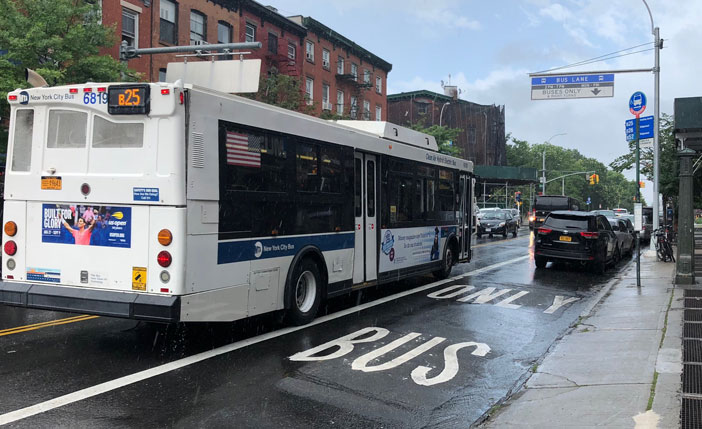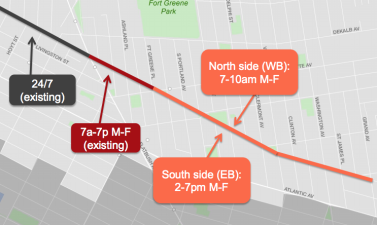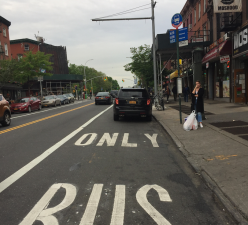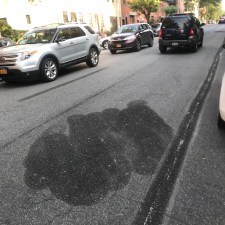Anatomy of a Busted Bus Lane
No bus drivers could use the new Fulton Street bus lane during a recent afternoon spot check - there were too many cars in the way.

Two months after DOT extended the Fulton Street bus lanes from Fort Greene into Clinton Hill, how are they working out? Well, going by a recent spot check, the bus lanes are blocked so much they’re practically useless for riders on the B25 and B26.
Taking a cue from a Fulton Street regular and TransitCenter’s recent bus lane inspection in Manhattan, I headed over to Fulton Street on Friday afternoon at 2 p.m. when the eastbound bus lane goes into effect. I watched for half an hour, making two sweeps of the bus lane between Fort Greene Place and Carlton Avenue, and didn’t see a single bus driver use the bus lane for even a single block.
They couldn’t — there were too many cars in the way. One standing room-only bus after another went by in the general traffic lane, getting none of the benefit of transit priority.
Over by Carlton Avenue, NYPD traffic agents were indeed ticketing and towing cars. Maybe, at some point later in the day, they successfully cleared some blocks. But they had an uphill battle. After two months, no habit of mind has developed among the drivers who park on Fulton Street. The bus lane was absolutely crammed with parked cars, and towing cars out of the bus lane one by one takes time.
There are a few things working against this bus lane. It’s only in effect for five hours each day, from 2 to 7 p.m., so drivers have to be aware of when the rules kick into effect. Nor does the bus lane stick out and boldly declare itself — it’s not painted red. DOT reserves the terra cotta treatment for bus lanes in effect at least six hours a day. These bus lanes almost made the cut, but local businesses and Council Member Laurie Cumbo pressured DOT to cut three hours of bus priority in the morning.
And like every other bus lane in the city, the Fulton Street bus lane is vulnerable to abuse by people who know how to cheat the system.
This was the first bus to pass after 2 p.m., a B52 which uses the western blocks of the new bus lane. At the time, the bus lane was nearly 100 percent occupied by parked cars.
A few blocks east, between Cumberland and Carlton, this minivan with South Carolina plates was the main obstacle on an otherwise clear block. The B26 was thisclose to getting a usable stretch of bus lane:
And a traffic enforcement agent did in fact ticket the van. The agent, who was parked in the bus lane, told me he’d been working Fulton Street for two months and that bus lane observance is getting better. Evidence was in short supply, however.
As it happens, the “funeral” on the dash of the South Carolina minivan planted a seed of doubt with the NYPD tow truck operator, who was about to haul away this bus lane blocker…
Before he did, he asked me if I’d seen a funeral. I said I hadn’t (I later looked up the nearest funeral home — it’s a half-mile walk away), but he still decided to tow another car instead.
I circled back to where I started.
By 2:30, the beginning of the new bus lane segment — the block between Fort Greene Place and S. Elliott Place — was finally clear. But bus drivers still weren’t using it:
Why? Well, there was no point driving in a bus lane for a few feet only to merge around this Ford Escape in NYC Transit livery parked on the next block:
So that was my half hour on Fulton Street, watching a bus lane that no bus ever used.









